Search
Showing 10 of 1954 results for NARSC 2016 conference registration fees student pre advance late July 2016
-
Meet ENZ’s team in South-South east Asia
The team’s Regional Director, Ziena Jalil, has been working with senior management at ENZ to build the capacity of the team to best contribute to New Zealand’s international education goals.
The team’s approach to strengthening New Zealand’s presence and engagement in the region has included the recruitment of staff to manage changes but also to fill gaps in experience and skills critical to success in five key markets for ENZ in the SSEA region which are currently India, Indonesia, Malaysia, Thailand and Viet Nam.
Late last month Jane Goh joined ENZ as Marketing and Strategic Relations Manager, Malaysia, based in Kuala Lumpur. Jane came to ENZ from Mondelez International where she was the Communications Manager, having previously worked for Draft FCB and Taylor’s Education Group also in Kuala Lumpur. While at Taylor’s, Jane led a major project to re-energise alumni relations as well as looking after advertising and promotions across the group, and so she is well placed to boost New Zealand’s education profile, with the right skills to also strengthen important channels.
In early January ENZ also appointed Marketing and Strategic Relations Managers in Thailand and Indonesia.
Chortip Pramoolpol is based in Bangkok. Most recently Chortip was Zespri International Limited’s Marketing Manager - Thailand. She oversaw overall sales, marketing, customer relations and operations of the Zespri business in Thailand and drove considerable growth.
Prior to Zespri, Chortip worked for Grayling Thailand, Keppel Thai Properties and New Zealand Trade and Enterprise in corporate communications, marketing, business development and international investment roles. Chortip has also worked at a marketing research company in Australia and a property company in Singapore. She holds a Master of Business in International Marketing from the University of Technology, Sydney, Australia.
Karmela Christy is ENZ’s Marketing and Strategic Relations Manager based in Jakarta. Before joining ENZ Karmela worked as a Business Analyst and Marketing Manager for Lloyd Morgan Executive based in Shanghai. She developed marketing, branding, events, PR and communications strategies for five Lloyd Morgan offices across China.
Prior to Lloyd Morgan, Karmela worked for the Global Supply Chain Council, Essential Group, and the University of Pelita Harapan in events and marketing roles. She holds a Bachelor Degree in Marketing from the University of Pelita Harapan, Indonesia.
The Marketing and Strategic Relations Managers have responsibility for establishing and managing key relationships in market including those with government and the education industry. They also provide information on market opportunities for New Zealand, lead arrangements of ENZ marketing and promotional activities, and facilitate introductions and discussions with local stakeholders, with a view to growing awareness and student numbers.
Chortip, Karmela and Jane join the wider SSEA team of:
-
Margaret Low, Education Assistant in Malaysia
-
Dinh Duong, Market Development Manager in Viet Nam
-
The India team in Delhi, Jugnu Roy (Lead Events and Channels SSEA & Marketing and Strategic Relations Manager South Asia), Monika Chaudhary (Market Development Manager) and Shahbuddin Khan (Driver and Administration Assistant) and Mumbai based Shailaja Vora (Market Development Manager).
-
The SSEA Wellington based team of Lead International Market Manager South-South East Asia, Francesca Hilbron, and International Market Manager South East Asia, Johnny Tramoundanas-Can.
The SSEA team is led by Ziena Jalil, ENZ’s Regional Director South-South East based in New Delhi.
The SSEA team welcomes collaboration with the New Zealand education industry, to work together on SSEA’s two key goals of growing student numbers and facilitating introductions that will lead to education business. The team sits within ENZ’s wider International team and works closely with ENZ’s Marketing and Business Development teams.
You can contact us through ENZ’s Business Development team or through the following emails: asean@enz.govt.nz and india@enz.govt.nz
-
-
11 million engagements across channels
Patrick Holden, ENZ’s Digital Media Project Manager, said this makes it ENZ's single largest marketing campaign yet.
“We are really pleased with how ENZ’s ‘Future Proof’ campaign has been tracking since its launch on 19 March,” he said.
New Zealand was ranked the #1 country in the world for educating students for the future, according to a report by The Economist Intelligence Unit (EIU) released late last year.
On 19 March, ENZ launched an eight-week global campaign to promote the ranking and encourage international students to sign-up to ENZ’s database marketing programme.
The first ‘dream’ phase of the campaign focused on awareness.
“We reached over 30 million people and have had 11,757,000 engagements across our digital and social ecosystem.
“This is the largest qualified audience ENZ has ever achieved in a single campaign.”
The second phase of the campaign started on 1 April and is focussed on converting the audience into enquiries to institutions. Ten days in, 11,600 referrals have been made.
The ‘Future proof’ campaign integrates ENZ’s social communities and digital channels via ENZ’s student attraction engine and is the first campaign integrated with the database marketing platform.
The third ‘decide’ phase will introduce the My StudyNZ member centre tool for which we received excellent feedback from the pilot prospective student group.
-
NauMai NZ is 2
Since launch, NauMai NZ has had half a million page views and just under 300,000 users accessing practical resources on topics such as Visas and immigration, Personal wellbeing, Housing, and Working, not to mention learning about Māori culture, improving English language skills, making friends, living like a local or getting a part time job.
The platform has a bounce rate of just 15% and 11,500 students have joined the NauMai NZ database. ENZ’s AI chatbot Tohu sits on the platform, and the NauMai NZ WeChat mini programme launched late last year, ensures resources are delivered to the platform of choice for Chinese students.
One focus in 2020 was obviously how to respond to the COVID-19 pandemic. An official COVID-19 page was launched, collating and curating trusted and relevant government information particular to international students. To accompany this page, a ‘Stay Well, Stay Connected’ page was launched, recognising the particular challenges that the pandemic brings around health and wellbeing. These pages have to date received over 90,000 views.
Throughout 2020, content that wasn’t COVID-19 specific was also developed. Through research, we identified and developed new topics including Managing your money, Sexual healthcare and Dating, relationships and sex.
As the 2020 academic year ended and borders remained closed, the ‘Summer in NZ’ microsite was launched, remaining live until April this year. The purpose was to inform and support students remaining in New Zealand over summer when they would normally return to their families and home country. The Student Experience team at ENZ was very aware that an unexpected summer in New Zealand may put stress on some students.
We pulled together information from multiple sources, including from tourism operators and regional development agencies. Summer partnerships with LinkedIn and AFS New Zealand were also promoted to proactively engage students with their skill development resources.
NauMai NZ is still growing and as 2021 moves at pace, ongoing content development continues alongside user journey review and improvement.
“NauMai NZ is a valuable resource enabling ENZ to communicate with and support international students – particularly during the pandemic,” ENZ Director – Student Experience & Global Citizens, Sahinde Pala, says.
“We look forward to evolving it to better serve students’ needs, both in New Zealand and offshore, in 2021 and beyond.”
2021 brings a complexity of challenges for students. The challenge for NauMai NZ is to meet and address those challenges - better supporting the many students who remain studying in New Zealand and the increasing numbers of those studying offshore with a New Zealand provider, and of course being ready to welcome students when they are able to travel here in the future.
But for now, happy birthday NauMai NZ, and a big thank you from us to everyone who has supported its development and use.
-
Reconnecting with stakeholders in Japan
Across the two days, 68 representatives from education and travel agencies, schools, universities and ENZ’s education partners in Japan networked with 19 New Zealand education providers, regional representatives and edtech company, Chasing Time English, and heard updates from ENZ. Networking opportunities included one-on-one meetings, and a reception at iki, a newly opened New Zealand-themed roastery and eatery in Tokyo. Key Japanese partners including ENZRA agents, Ministry of Education, Culture, Sports, Science and Technology, and ENZ’s Education Cooperation Partners: Tokyo Metropolitan Board of Education, Japan Women’s University and Waseda University attended the event.
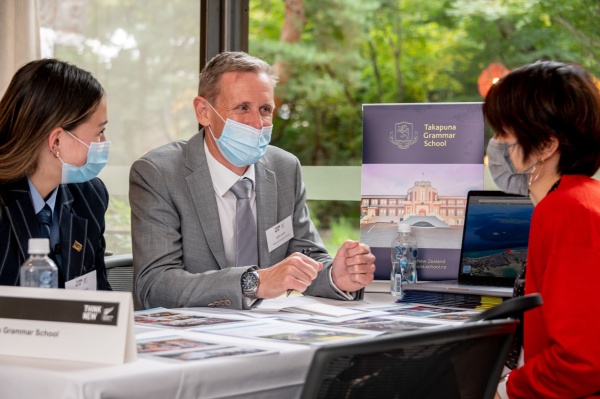
In terms of market trends, Misa Kitaoka, ENZ’s Director of Education in Japan, noted the increasing demand for “one term school study” in New Zealand, which can be attributed to changes made in admission requirements by the Japanese universities.
“With the Japanese government’s internationalisation efforts, more and more universities in Japan are now adopting a holistic assessment of applicants, based on their high school grades, English language skills, extracurricular activities, and essays, in addition to the traditional written exams,” Ms Kitaoka says.
“Students who study abroad have a competitive advantage in these assessments – their English and communication skills improve, and they gain a wide range of life experiences overseas. With this new trend, we are expecting to see more secondary schools sending their students for one term or longer to New Zealand, to help them prepare for admission to university.”
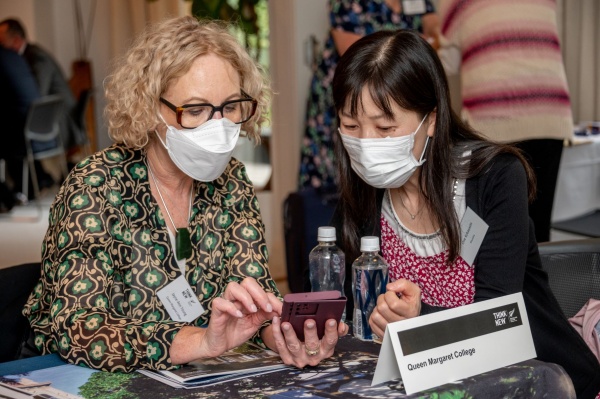
Japanese agents and educators are also interested in New Zealand’s full Bachelor’s degree programmes, given the increasing number of bilingual Japanese/English students in Japan. With more International Baccalaureate (IB) schools (the Japanese government’s current target is 200 IB schools) and the improvement of English language education in Japan, more students in Japan are prepared to apply directly to New Zealand tertiary institutions after finishing high school.
“We are excited to work with ENZ to start an annual, outbound group study programme for our affiliated schools,” Ryohei Matsuoka from the International Office at Waseda University said. “We are planning to send more than 70 Waseda high school students to Manawatu and Hawke’s Bay in March 2023. With Waseda’s increasing interest in New Zealand’s tertiary education, the programme will incorporate visits to tertiary institutions in addition to study at secondary schools.”
ENZ and Air New Zealand are co-hosting and co-funding a “famil” for the executive members of Waseda University and its affiliated schools in late November, visiting schools and tertiary institutions in the two regions mentioned above.
Due to Japan’s border restrictions which were in place until October, and the ongoing Covid-19 restrictions, ENZ did not undertake a student-facing event this year, and is planning to restart student fairs in 2023.
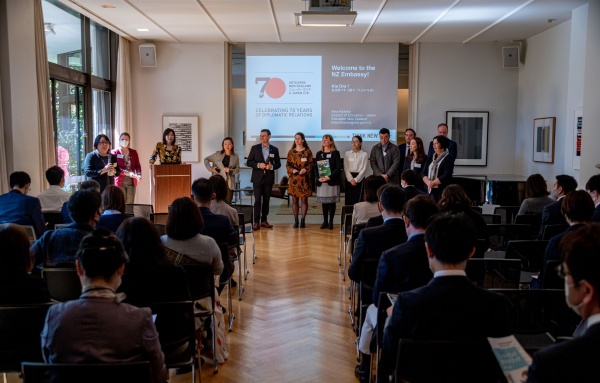
Social media coverage of the stakeholder events was well received and generated a high level of engagement.
-
Reflections from English Teachers in South Korea
In January 2024, six New Zealand teachers were selected to spend part of their summer season teaching English in South Korea as part of the New Zealand Korea FTA Partnership English Language Training Programme.
This programme is supported by Education New Zealand Manapou ki te Ao (ENZ) who assists with the teacher recruitment process. This was one of the key KNZFTA programmes recently discussed during the South Korea Government delegation visit to New Zealand late last year.
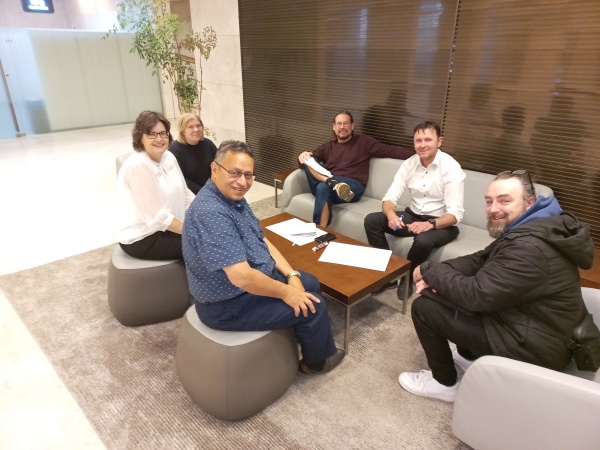
The group of six New Zealand teachers selected to teach English in South Korea in January. From left, Jane Bassett, Food Technology Teacher from Havelock North Intermediate School, Sharon Powell, English Teacher from Long Bay College in Auckland, Kara Shortland, Acting Team Leader (Bilingual) from Whangārei Intermediate School Te Tai Tokerau. Glenn Cheyne, Head of Learning Area Social Sciences from Nayland College in Nelson, Gordon Sim, Social Science teacher from Hillcrest High School in Hamilton, and Dan Greer, Social Studies/Drama teacher from Logan Park High School in Dunedin.
Kay Lee, ENZ Senior Market Development Manager – Korea, said that it was an absolute pleasure to see New Zealand teachers continue to travel to South Korea to teach English during their summer break.
“There are so many positive outcomes from the running of this cross-cultural programme for both the Korean students and the New Zealand teachers participating.
"On one hand, the students get the opportunity to hone their English language skills while experiencing the New Zealand teaching style, learning more about New Zealand, including its culture and education system. Meanwhile, while teaching English and serving as ambassadors of a New Zealand education, the teachers can immerse themselves in Korean life for a few weeks, seeing new sights, trying new food and making new friends.
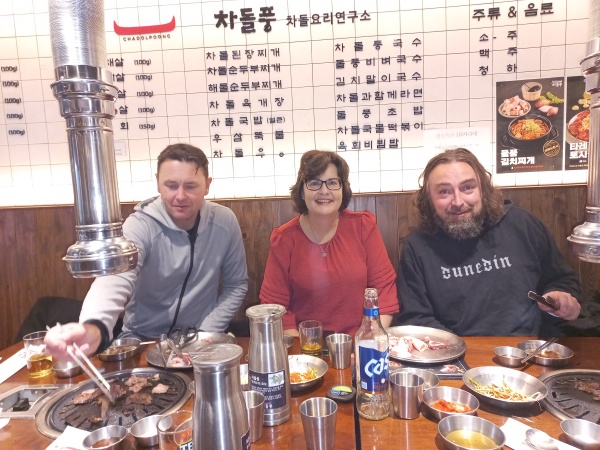
Gordon, Jane, and Dan, sampling Korean cuisine at the end of the teaching day.
"Our Korean government partner for educational programmes, EPIS, has acknowledged ENZ for its significant contribution to the programme’s success through effective teacher recruitment. These positive outcomes are testament to the strength of our NZ-Korea Government-to-Government partnership,” added Kay.
Upon their return to New Zealand, two of the teachers who are trained in teaching English as a Second Language (ESL), shared their experiences with ENZ. Read on to hear about the reflections from their two weeks abroad....
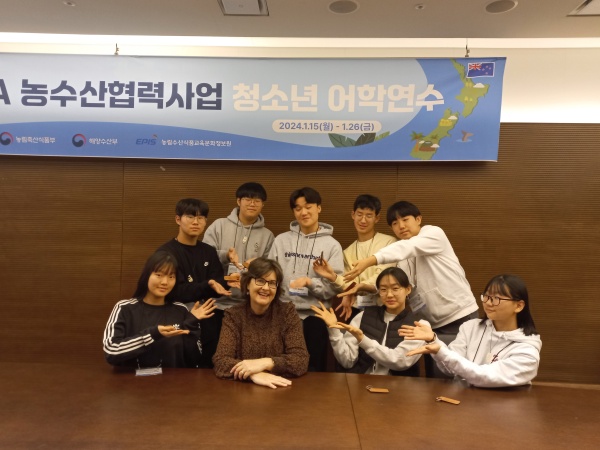
Jane Bassett (지안 (Jian) from Havelock North Intermediate School with her students.
Jane Bassett is a Food Technology teacher at Havelock North Intermediate School and said that the experience of exchanging cultures whilst teaching in an overseas classroom environment was an absolute privilege.
“Our students were aged 14 – 17 years old and came from all over South Korea with family backgrounds in the Agricultural and Fisheries industries. Each student had been awarded a scholarship from the Korean government to attend the two-week intensive English programme organised by the Hyundai Research Institute.
"The Institute went above and beyond in their efforts to ensure an incredible experience for both the students and our group of teachers.
“The teaching programme included a wide range of modules and as well as English grammar, we covered lessons on New Zealand culture, history, tourism, agriculture, sports, famous New Zealanders, and school life. My class was also exposed to the New Zealand Technology curriculum and was tasked with developing a new snack product. As part of the project, I introduced them to several New Zealand snacks and Kiwi classics such as WeetBix, Marmite and Watties Baked Beans, to varying degrees of enjoyment!”
Students were encouraged to speak in English throughout the day via fun-games, readings, conversations and plays so that the teachers could fine-tune their English to help them become more fluent with more natural English phrasing.
"We also explained aspects of Māori culture and the significance of pepeha (way of introduction). The students, who were from agricultural and fisheries backgrounds, were quickly able to identify their own awa (river) and maunga (mountain), showing their own personal connection to their land.”
Jane said that a personal highlight was being able to spend her birthday in Seoul learning about Korean cuisine through a cooking class on kimchi making and tea ceremony in a traditional house. She admitted that this was an appropriate birthday experience for a New Zealand Food Technology teacher!
She summed up the experience by saying that the group of teachers gained a greater understanding of cultural diversity and appreciation of the challenges learning English poses for new learners, learnings which they will take home with them.
“We really hope that our students will remember their experience as fondly as we will and that they will look to study and visit New Zealand in the future.”
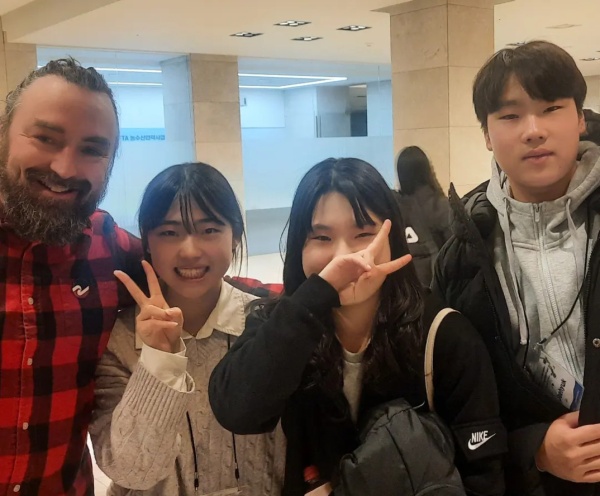
Drama and Social Studies teacher, Dan Greer, of Logan Park High School with three of his students.
Dan Greer, is a drama and social studies secondary school teacher from Logan Park School in Dunedin. He joined Jane as one of the six teachers selected to travel to South Korea, his second experience as an English language teacher in South Korea, having taught in Ulsan 12 years ago.
“I had such an amazing time participating in the Hyundai Research Institute’s programme. It was great to have other quality teachers on this experience with me and we were able to work together, mixing up the style of teaching and activities. I had the more beginner level class, and as a drama teacher we added games to my traditional English teaching. The students really enjoyed it, and it gave them more confidence to give things a go”.
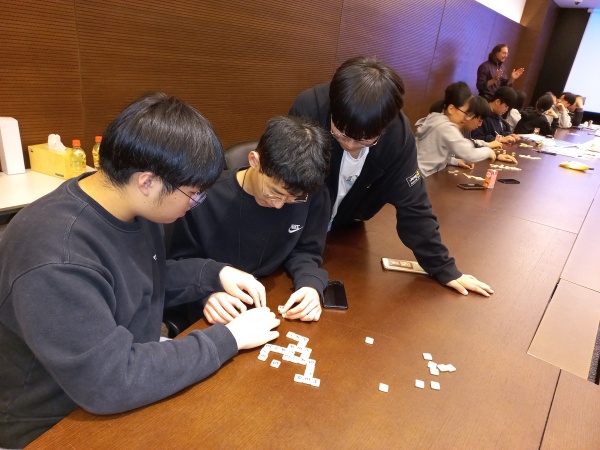
Dan reflected on the fact that there was one practice of teaching English in Korea that he had often thought was a little unfair, that being the naming of Korean students with English names.
“As an English teacher in Korea, you are often asked to name Korean students with English names. Sometimes this is because they want them, sometimes it is because they ’have’ to, and for many it is because westerners find Korean names hard to pronounce. I have named nine children in my life, one being my daughter and the other eight have been my Korean students”.
Dan used this practice as a topic of discussion in class one day and shared his opinion that it had not always felt right to him as he felt that if Korean students were taking the time to learn the English language, that teachers should make an effort in return.
He then asked his students whether English teachers should have Korean names. This prompted them to ask many questions about Dan including who he is when he is not “Dan the teacher”, his whakapapa, and the meaning of his name in English.
Dan said “You can imagine my surprise when my students were all waiting for me when I arrived the next day. One wonderful student then stood up and using perfect English gifted me a Korean name. I was no longer just “Dan the Teacher,” but also now 도혁 (Dohyuk), which meant I was ‘leading them to a bright path’.
“This was such a humbling experience that I will cherish forever. For me, this is what makes teaching and life so special,” added 도혁 (Dan).
If the Korean organisers decide to run the NZ-Korea FTA Partnership English Language Training Programme in the future, ENZ will continue to share the applications with NZ school teachers through the Asia NZ Foundation and Schools International Education Business Association (SIEBA).
-
Successful agent engagement and student recruitment drive in Malaysia
The events aimed to gauge student interest in studying in New Zealand and deepen collaboration with education agents and schools.
To kick off the series, in early March, ENZ and representatives from New Zealand universities co-hosted a morning tea information session and focus group for Malaysian education agents in Kuala Lumpur.
The session promoted the ENZ resources available to support agents, and representatives from University of Auckland, University of Canterbury, Massey University, University of Otago, and University of Waikato led a discussion exploring key messages that resonate with Malaysian students and parents, understanding the factors influencing destination choice and brainstorming strategies to strengthen New Zealand’s brand visibility.
The event brought together 11 agencies from across Kuala Lumpur.
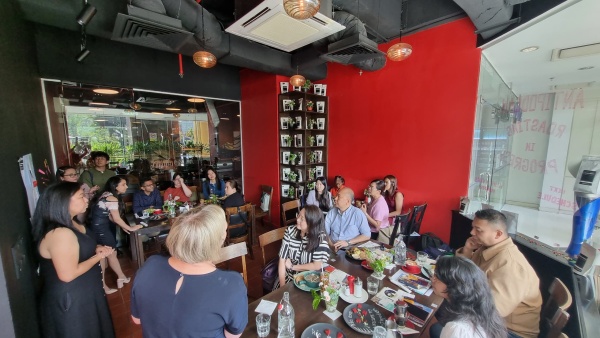
Co-funded agent activity
ENZ supported three key education agencies from across Malaysia to undertake co-funded student recruitment activity.
In Selangor, AECC Global Malaysia and ENZ hosted a mini-booth fair at HELP International School – giving students the opportunity to interact directly with representatives from Auckland University of Technology, the University of Auckland, the University of Canterbury, University of Otago, and the University of Waikato.
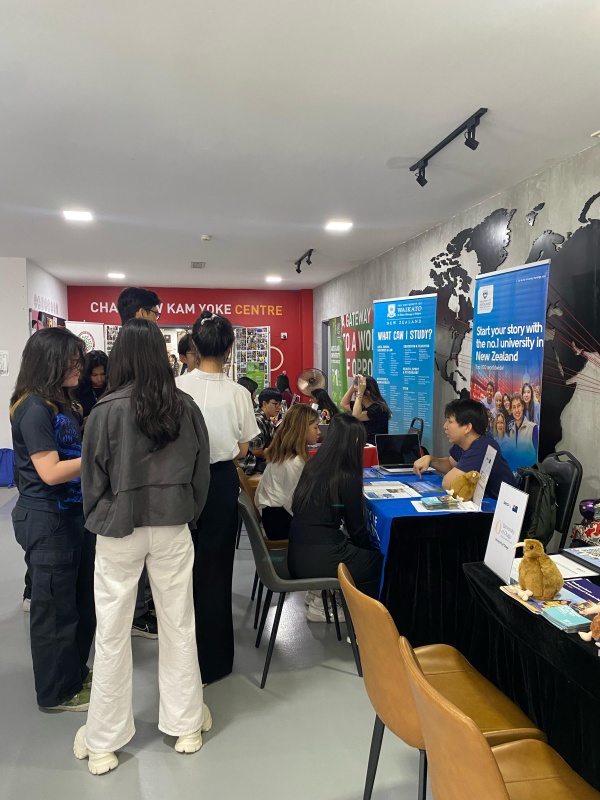
The mini-booth fair at HELP International School.
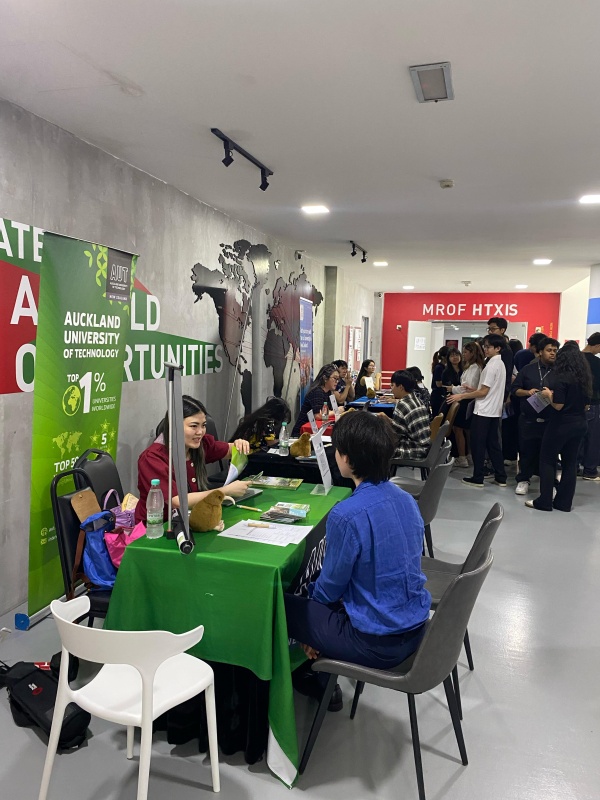
The mini-booth fair at HELP International School.
Over to Shah Alam, SELSET Education partnered with INTEC College to host an information session showcasing eight of New Zealand’s tertiary institutions.
INTEC College students heard from the Auckland University of Technology, the University of Auckland, University of Canterbury, University of Otago, University of Waikato, Southern Institute of Technology, Nelson Marlborough Institute of Technology and pathway provider, University of Canterbury International College.
Around 100 students were in attendance, and the session was followed by an opportunity for students to chat further with the study providers on show.
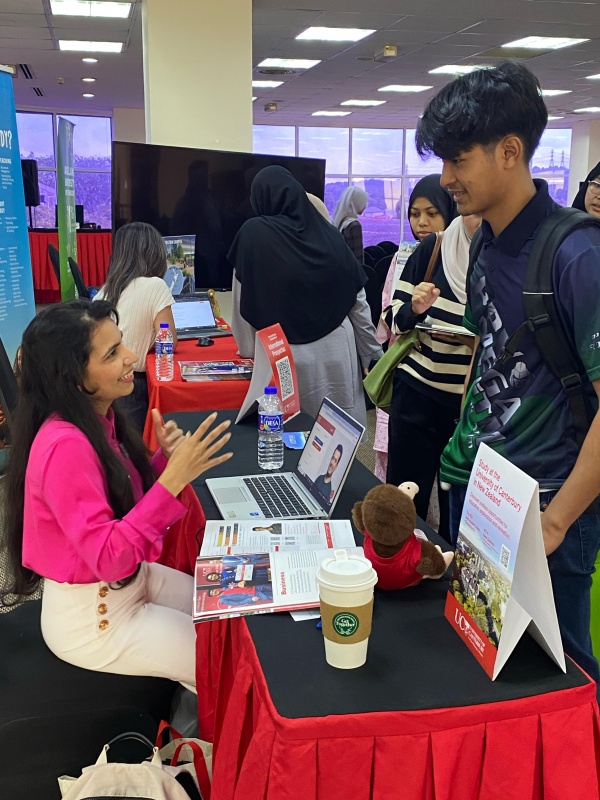
Students at INTEC College exploring New Zealand tertiary education study options.
To close out the co-funded activity, ENZ made its first official visit to East Malaysia since before the pandemic.
ENZ and JM Education partnered to lead a series of school visits in late April Kota Kinabalu, Sabah.
Around 400 students attended information sessions across three schools. The events were led by the University of Auckland and University of Otago at Kota Kinabalu High School, Sekolah Menengah Sains Sabah, and Maktab Nasional.
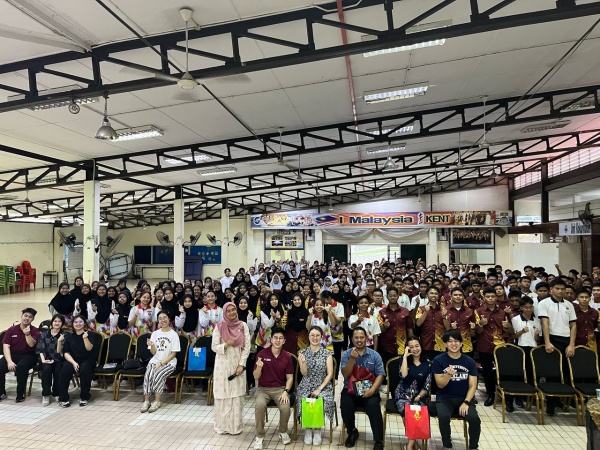
Attendees of one of the information sessions.
ENZ Market Manager for Indonesia and Malaysia, Naluri Bella, said that partnering with agents for co-funding targeted activities helps enhance both agents and students’ awareness and understanding of New Zealand’s unique education offering.
“These collaborations not only build trust and commitment among agents but also positions New Zealand as a competitive and credible choice for Malaysian students,” she said.
-
AUT signs arts and culture partnership with Indonesia
The New Zealand Arts & Culture Development Programme has been created by AUT to help MoEC cultivate a sense of belonging, identity and celebration of the diversity of culture and arts unique to Indonesia for future generations.
The MoEC has selected 50 active arts and culture workers, expected to be future leaders in their fields, across a range of different sectors, including: history, museum & gallery, dance, theatre, music, literacy, film and visual art.
Professor Nigel Hemmington, Dean – Faculty of Culture and Society, Pro Vice-Chancellor International, said the programme would build stronger ties between AUT and Indonesia.
“The signing of the agreement signals a major development in the university’s relationship with Indonesia and serves as a preliminary project for the wider programme, Project Taman, where AUT will lead (with Victoria University of Wellington and University of Auckland) the professional development of Indonesian school teachers In New Zealand in 2017,” says Professor Hemmington.
During the New Zealand-based training, to be held 14 November – 3 December, participants will undergo experiential learning including mentorships, seminars, workshop sessions, presentations, guest speakers, site visits and a field trip.
The programme includes a three-day pre-departure briefing to familiarise participants with the programme, as well as a post-departure evaluation that will be conducted in Jakarta in early 2017.
-
Safety app available to students
 Launched in Rotorua last week, the app was designed by Toi Ohomai external contractor Paramdip Singh for anyone to get help quickly if they have concerns about their safety.
Launched in Rotorua last week, the app was designed by Toi Ohomai external contractor Paramdip Singh for anyone to get help quickly if they have concerns about their safety.The app works similarly to a panic button – pressing the app icon sends an emergency message to all nominated contacts and begins voice recording the surroundings.
The pre-embedded message reads "PLEASE HELP", but can be customised if people wish. The message also includes the user's GPS location.
Graeme Rennie, Head of International at Toi Ohomai, said it is a great initiative invented in Rotorua for the benefit of international students and the community.
The app is free to download from the Google play store.
-
Market insights from Japanese media
The journalists represented a range of Japanese news media with audiences of various interests, ages and social groups:
- Sachiko Habu, Editor-in-Chief of Nikkei DUAL, a digital magazine for working parents
- Ryo Fujii, Deputy Editor of CNET Japan, focused on technology and innovation news
- Yuko Okumura, a freelance journalist for Glolea!, promoting study abroad for Japanese students.
The journalists visited secondary schools, English language schools, early childhood education (ECE) providers and government agencies involved in technology-focused start-ups.
Misa Kitaoka, ENZ’s Senior Market Development Manager – Japan, said New Zealand’s approach to education was considered very forward-thinking in Japan.
“They realised that education in New Zealand is not about only acquiring knowledge, which is still the case in Japan, but about what one can do with the knowledge in dealing with the uncertainties that come with the accelerated globalisation and digitisation in society.”
New Zealand’s world-first education ranking for instilling future skills resonated with the journalists, as did the Government’s push to enable innovation in the private sector, its tertiary qualifications framework for ITPs, and unique ECE curriculum.
Government-led initiatives such as CreativeHQ were very attractive to the journalists as well.
“In Japan, it’s usually the private sector that drives innovation so seeing a government-led initiative in New Zealand really made an impression,” said Misa.
The journalists were interested that some New Zealand schools offered the International Baccalaureate (IB), which could be a pathway to tertiary study options in Japan, New Zealand, US and the UK.
“IB is a hot topic in Japan at the moment, with the Japanese government promoting international education and introducing international curricula such as the IB diploma to Japanese schools,” said Misa.

The journalists enjoy a Kiwi classic - hokey pokey ice cream.
The topic of Japanese parents bringing their pre-school children to an English-speaking country like New Zealand for a short-term immersion – the ‘barefeet study abroad’ experience, as one journalist put it – was also of interest. The journalists appreciated the “unique learning environment” offered by the New Zealand ECEs they visited.
“They were impressed to see children immersed in nature while learning how to be independent and resilient,” said Misa.
New Zealand’s high quality of life, healthy work-life balance and the flexibility of “work from home” also made a good impression.
-
Innovative ENZ universities’ partnership a key part of sector’s COVID-19 recovery and rebuild
Education New Zealand and New Zealand’s eight universities have announced a new partnership with UK-based qualifications provider the University Consortium (NCUK) that will allow students from more than 30 countries to begin a New Zealand university qualification without leaving home.
The partnership will play an important role in implementing the Government’s COVID-19 Strategic Recovery Plan for International Education.
ENZ Chief Executive Grant McPherson said the Pathway initiative is key to the shift in New Zealand’s international education approach that will make the sector more resilient over the next few years.
“It is a tangible demonstration of New Zealand providing flexible and diverse education options for students that will enhance sector’s resilience and sustainability in the face of global change,” Grant said.
This agreement is part of a broader ENZ Global New Zealand Education Pathways initiative, through which ENZ is extending its activities to enable students to connect with blended, online, digital and full qualification study options.
In support of this initiative, ENZ has extended its Study in New Zealand website to enable all New Zealand quality-assured education providers to add global delivery sites over time, where students undertake learning for a qualification offshore.
The pathways initiative enables international students to begin study in their home countries towards Bachelor’s and Master’s degrees at any of New Zealand’s eight universities. It leverages NCUK’s quality-assured global network of 81 recognised Study Centres.
Students commencing the pathway in 2021 could start their study either online or in New Zealand, in 2022 or 2023, once they complete one of three relevant NCUK pathway qualifications – a one-year international foundation year programme to enter an undergraduate degree in New Zealand; or a one-year international year one programme, equivalent to one year’s study towards a business or engineering Bachelor’s degree; or a pre-Master’s programme towards a Master’s degree in New Zealand.
All New Zealand universities are supporting this latest partnership, committing at least $300,000 per annum across the sector in dedicated NCUK scholarships. Universities New Zealand has recognised the NCUK Foundation Year programme as being equivalent to University Entrance.
Universities New Zealand Chief Executive Chris Whelan said New Zealand’s universities were committed to developing innovative solutions that connect New Zealand to students globally.
“The partnership will give students flexibility to work towards New Zealand university undergraduate and postgraduate qualifications while borders are closed.
“International education is a critical component of building the quality of our education offering – specifically in areas such as research and development. The ‘team New Zealand’ approach taken by our universities will enable us to better attract students who are sought after by universities all over the world,” Whelan said.
ENZ General Manager – Partnerships and Marketing, Paul Irwin, said the initiative also has strong potential to be extended across the wider New Zealand education sector.
“This has great potential to be developed for the wider New Zealand education sector with diverse study options such as new blended, online, digital and full qualifications.”
NCUK Study Centres will start promoting pathway qualifications to study at New Zealand universities from December for the next cohort intake in March 2021.
The offshore pathways initiative has involved nearly all ENZ’s teams - both onshore and offshore – including International, Industry, Marketing (Digital and Brand) and Communications.
The Pathways partnership will help develop a pipeline of international students to study in New Zealand when the time is right. The partnership is part of the Government’s Recovery Plan for international education, which invests $10 million over three years towards innovative products and modes of education delivery that will enable the international education sector to not only recover from the shock of COVID-19, but transform to a more diversified, sustainable future state.
Further information on the New Zealand Global Education Pathways initiative can be found at http://studyinnewzealand.govt.nz/global-pathways.

